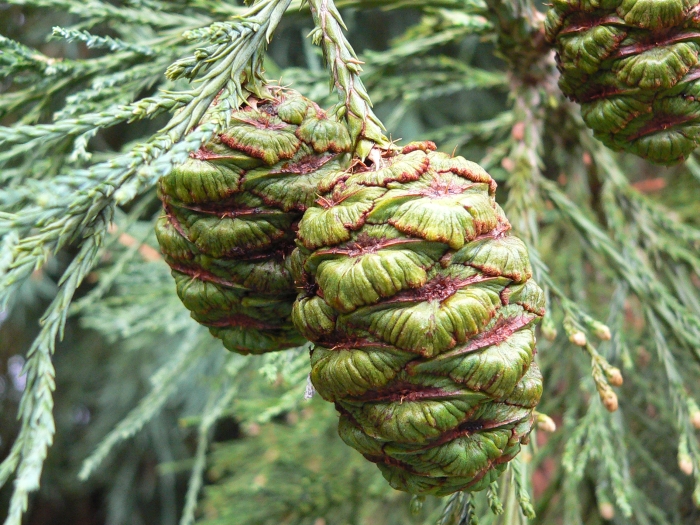Giant Sequoia
(Sequoiadendron giganteum)
Giant Sequoia (Sequoiadendron giganteum)
/
/

Thereidshome
Public domain
Image By:
Thereidshome
Recorded By:
Copyright:
Public domain
Copyright Notice:
Photo by: Thereidshome | License Type: Public domain | License URL: https://creativecommons.org/public-domain/ | Uploader: Thereidshome | Publisher: Wikimedia Commons | Title: GreenSeedConesSequoiadendronGiganteum.JPG | Notes: {{subst:User:Multichill/Starr|subst=subst:|URI=020803-0065|Species=Setaria palmifolia|Description=habit|Location=Wahinepee|Island=Maui|Date=03-08-2002}} |














































































Estimated Native Range
Summary
Sequoiadendron giganteum, commonly known as Giant Sequoia, is an evergreen tree native to the montane forests of the Sierra Nevada in California. These trees are among the most massive living organisms on Earth, with mature specimens reaching an average height of 50–85 m (164–279 ft) and trunk diameters of 6–8 m (20–26 ft). The record height for a Giant Sequoia is 94.8 m (311 ft), and the General Grant tree boasts the greatest diameter at breast height, measuring 8.8 m (28.9 ft). The claim that coast redwoods have greater trunk diameters than all known giant sequoias has been contested and is not widely accepted. Giant Sequoias are notable for their thick, fibrous, reddish-brown bark, which can be up to 90 cm (3 ft) thick, and their distinctive, scale-like blue-green leaves.
Giant Sequoias are valued for their grandeur and longevity, making them popular ornamental trees in parks and large gardens. They are adaptable to a variety of climates outside their natural range, including western and southern Europe, the Pacific Northwest up to southwest British Columbia, the southern United States, southeast Australia, New Zealand, and central-southern Chile. They require full sun and can tolerate temperatures as low as −31 °C (−25 °F) briefly if the roots are protected. However, they are susceptible to windburn outside their native habitat. These trees prefer well-drained soils and require regular, moderate watering. Despite their size, Giant Sequoias have a shallow root system, which can pose a risk of toppling in high winds or saturated soils. They are also vulnerable to fungal diseases such as root rot and canker disease.CC BY-SA 4.0
Giant Sequoias are valued for their grandeur and longevity, making them popular ornamental trees in parks and large gardens. They are adaptable to a variety of climates outside their natural range, including western and southern Europe, the Pacific Northwest up to southwest British Columbia, the southern United States, southeast Australia, New Zealand, and central-southern Chile. They require full sun and can tolerate temperatures as low as −31 °C (−25 °F) briefly if the roots are protected. However, they are susceptible to windburn outside their native habitat. These trees prefer well-drained soils and require regular, moderate watering. Despite their size, Giant Sequoias have a shallow root system, which can pose a risk of toppling in high winds or saturated soils. They are also vulnerable to fungal diseases such as root rot and canker disease.CC BY-SA 4.0
Plant Description
- Plant Type: Tree
- Height: 165-280 feet
- Width: 25-60 feet
- Growth Rate: Slow
- Flower Color: N/A
- Flowering Season: Non-Flowering
- Leaf Retention: Evergreen
Growth Requirements
- Sun: Full Sun
- Water: Medium
- Drainage: Fast, Medium
Common Uses
Deer Resistant, Drought Tolerant, Fire Resistant, Low Maintenance, Rock Garden
Natural Habitat
Montane forests of the Sierra Nevada in California
Other Names
Common Names: Big Tree , Sequoia , Sierra Redwood , Wellingtonia , Sierran Redwood , Giant Redwood , Sekvojovec Obrovský , Mammutbaum , Riesen-Sequoie , Riesen-Mammutbaum
Scientific Names: Sequoiadendron giganteum , Sequoia gigantea , Wellingtonia gigantea , Sequoia washingtoniana , Sequoia gigantea var. pendula , Sequoia wellingtonia , Washingtonia californica , Americus gigantea , Gigantabies wellingtoniana , Sequoia gigantea f. pendula
GBIF Accepted Name: Sequoiadendron giganteum (Lindl.) J.T.Buchholz